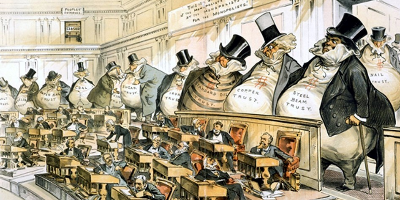Industrialization/Big Business (1 janv. 1862 – 1 janv. 1898)
Description:
GROWING FRUSTRATIONS OVER LAISSEZ FAIRE CAPITALIST SYSTEM- business and politics were closely connected
(tariffs)
Industrial Problems
- strikes, Panics
Industrialization Causes
- USA natural and human resources
- government support for business
- railroads
- inventions
INVENTIONS
- Electric light (Edison)
- can work longer hours
BIG BUSINESS
Railroads
- land and loans given by the federal
government
- new business practices -> modern stockholder
corporation, business management strategies,
financing, regulation of competition
- consolidation
- western expansion as a result
- Union Pacific (Irish) & Central Pacific (Chinese)
RAILROADS IMPACT
- unified domestic market
- mass distribution of all goods
- mass production and consumption
- growth of coal and steel industries
- immigration
- time zones
INTEGRATION
Horizontal Integration
- controlling all competition in an industry
- different names on paper, same owner
Vertical Integration
- control all aspects of manufacturing
IDEAS
- Laissez faire
- Survival of the Fittest
- to justify wealth gap
- "natural that wealthy are wealthy"
- Gospel of Wealh
- wealthy had a moral obligation to help
communities, NOT individuals
BIG BUSINESSMEN
Cornelius Vanderbilt
- railroads
Andrew Carnegie
- steel (Bessemer process)
- vertical integration
John Rockefeller
- oil
- Standard Oil Company (horizontal integration)
J.P. Morgan
- investment banking
CRITICS
- Henry George "Progress and Poverty"
- Edward Bellamy "Looking Backward"
- Progressive Movement
Ajouté au bande de temps:
Date:
1 janv. 1862
1 janv. 1898
~ 36 years
